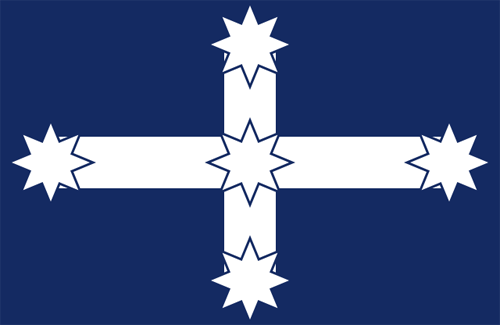[I would ignore the talk of ‘democracy’ in this article, since these men clearly wouldn’t have defended what is today known as ‘democracy.’ -Brett Light]
Sons of Eureka Stockade
October 7, 2013

“We swear by the Southern Cross to stand truly by each other and fight to defend our rights and liberties”.
(Oath sworn by diggers at Bakery Hill, 29 November 1854)
The Eureka uprising took place on 3rd December 1854. It followed years of constant discontent on the Victorian goldfields and has come to be regarded as a `milestone in Australian democracy’. The Eureka flag is closely associated with this struggle for democracy.
Before the Rebellion
In 1851 gold was discovered in the creeks and gullies surrounding the present day site of Ballarat. As much of Victoria was Crown land, gold could not be mined without permission and a system of licences was introduced. Struggling against bankruptcy and believing that many diggers were wealthy, the colonial government doubled the cost of the licence in early 1854 and the police intensified their preoccupation with `licence hunts’. The diggers had to pay their dues on demand and were harassed by officials – yet they had no voice in the administration of the goldfields.
The Eureka Uprising in Ballarat
A number of important events occurred in the months before the Rebellion. The most dramatic occurred in October 1854 when an angry mob burnt down James Bentley’s hotel. On 29th November when a `monster meeting’ of some 12,000 Ballarat residents took place at Bakery Hill, licences were burnt and two new developments took place. Hastily devised as a symbol of resistance, the Eureka flag was flown for the first time at the meeting and secondly, a little known Irishman, Peter Lalor (1827-1889) addressed the crowd. He reputedly called on all those present to “salute the Southern Cross as a refuge of all the oppressed from all countries on earth”. Lalor and a band of diggers then marched to the Eureka gold lead, the Southern Cross flag flying before them, on 2nd December, 1854. Here they erected a roughly built slab stockade. The goldfields Commissioner Robert Rede believed the police camp to be in danger and sent for reinforcements. By midnight only about one hundred and twenty diggers remained at the barricade. Around 3.30am on Sunday 3rd December, at least two hundred and ninety well-armed troops attacked the Stockade. A brief but bloody battle ensued; – “coarse cries and oaths came from the police, soldiers and rebels alike – cries of fear, of pain; shouts of rage, threats and … screams of horses, the crackling roar of weapon fire. Men fell, bleeding …”. (Transcript of incidents at Eureka derived from evidence at Eureka trials, February-March 1855 in B. O’Brien, Massacre at Eureka (Melbourne, 1992) p.89). Over thirty diggers and bystanders were killed. It was all over in a matter of minutes.
